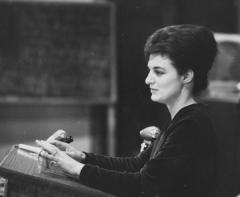Jane Faily starts by saying that as the “all human institutions are in disorder”; so too is Bahá’í marriage. We live in one of the most trying times in history.
Ms. Faily then explores the traditional roles of men and women in marriage and society. In the past there was stability and harmony in marriage; that order rested on the dominance of men and the compliance of women. That has disappeared. “We are in an awkward age.” The harmony has vanished. We need to recreate the institution of marriage based on Bahá’í teachings.
“Men and women are different: biologically, intellectually and emotionally.” Some shifting of traditional roles is predicted in the Bahá’í Writings. Men will become kinder, more gentle, more thoughtful than in the past. Women will take on more masculine roles as the couple consults and shares decision-making in the family.

